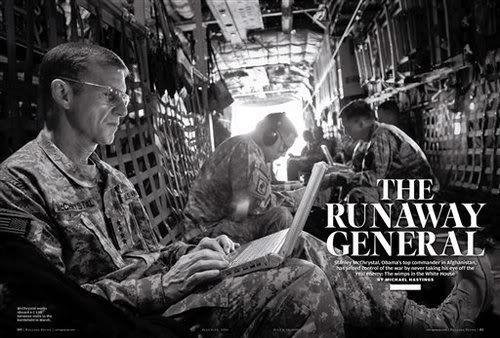
The unvarnished look at General McChrystal that just tanked his career was made available by a freelance reporter who wasn't beholden to almighty "access." So said Politico before they sent that little revelation down the memory hole.
The Politico was so hopped up about the story that it took the extraordinary step of posting on its site a PDF of Rolling Stone’s article because Rolling Stone had not put it online fast enough. In one of the many articles The Politico ran about the episode the following observation was made by reporters Gordon Lubold and Carol E. Lee:
McChrystal, an expert on counterterrorism and counterinsurgency, has long been thought to be uniquely qualified to lead in Afghanistan. But he is not known for being media savvy. Hastings, who has covered the wars in Iraq and Afghanistan for two years, according to the magazine, is not well-known within the Defense Department. And as a freelance reporter, Hastings would be considered a bigger risk to be given unfettered access, compared with a beat reporter, who would not risk burning bridges by publishing many of McChrystal’s remarks. [emphasis mine]. . .
Our reveal is looking pretty good, isn’t it? Gordon Lubold and Carol E. Lee let us in on a little trade secret. They have no motive to make it up. Lee is a beat reporter herself, qualified to speak on the subject. Lubold has covered the military for years. Politico trades in this kind of observation; it was founded to reveal some of journalism’s “state secrets.” Tom Ricks, a former beat reporter for the Washington Post who also covered the military, says pretty much the same thing: beat reporters have an investment in continuing the relationship so they are less risky for a powerful figure like McChrystal.
And then, the next day… the reveal disappears. The Politico erased it, as if the thing had never happened. Down the memory hole, like in Orwell’s 1984. The story as you encounter it online today doesn’t have that part (“would not risk burning bridges…”) in it. Clint Hendler of Columbia Journalism Review, who discovered the missing lines, asked The Politico about it…
Hendler got no answer. One wonders what access Politico is trying to preserve.








